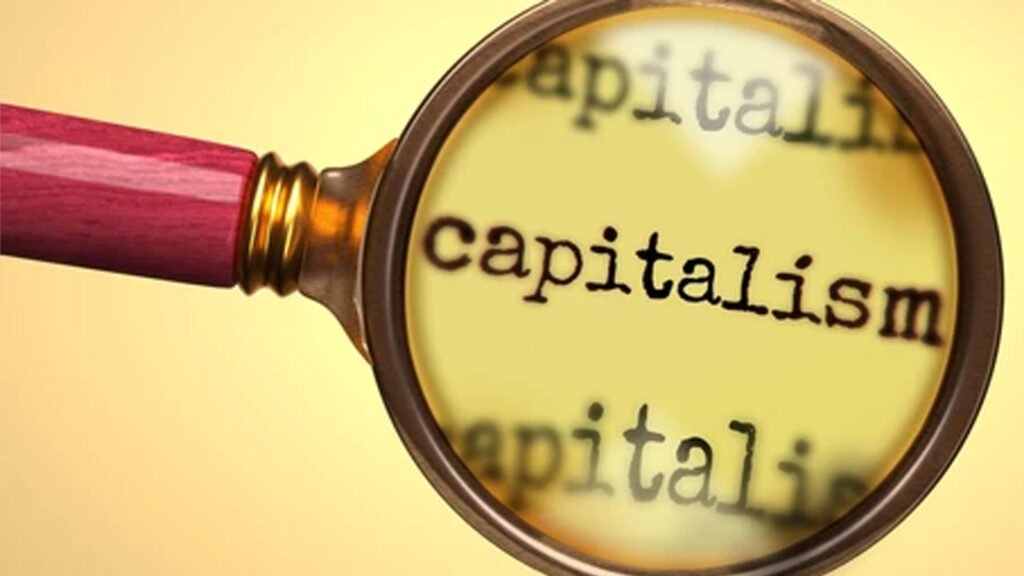Capitalism

Definition of capitalism
Capitalism refers to an economic system in which businesses, resources, goods and labour are owned by private entities. In such an economy, the role of government is limited to regulation and supervision. This economic system gives priority to production and profits.
Capitalism contrasts sharply with socialism which favours welfare and social equality. In a socialist economy, the government owns and controls production, investments and prices. With much less bureaucracy, private ownership generally leads to efficient production. Capitalist theories support competition that lowers prices due to innovation.
Key points to remember
Capitalism is an economic system in which the means of production belong to private entities.
Government control here is insignificant; price and production depend on supply and demand.
In the present day, most of the economies of the world are mixed in nature, with a mixture of capitalism and some degree of socialism.
Some nations have cronyism, in which a capitalist economy is run by private entities but closely associated with government entities.
How does capitalism work?
In capitalism, the private sector faces very little government interference or control. There is therefore strong competition between private players. Directly or indirectly, competition also widens the possibilities for development. The only potential concern is fair play. works well, governments really need to ensure that aggressive competition is also fair.
Capitalism is a theory. In practice, however, no country has a purely capitalist economy. In addition, a purely production-oriented economy could harm the well-being of citizens or violate human rights. Therefore, most of the world’s economies combine capitalism and socialism to balance economic growth and the public interest.
Characteristics
Capitalism has seven fundamental pillars; each is equally important for privatization and economic growth. The pillars are:
A capitalist economy represents an economic system in which people can trade without government restrictions or controls.
In a capitalist economy, individuals engaged in the production of goods or services may own capital goods such as land, buildings and machinery.
The capitalist economy operates on the function of supply of demand. If the demand for a particular item increases, so does its price. Likewise, if the supply of a product decreases, the price increases.
Every enterprise in the capitalist economy tries to maximize its profit. Therefore, there are no restrictions on the entry and exit of new business entities in this type of economy.
A capitalist economy gives priority to maximizing profits. People work for themselves, that is, for their individual gains and growth.
A free market promotes the coexistence of many private companies. As a result, consumers have more options, both for consumption and for investment.
In a capitalist economy, the government is little involved in the operation of private enterprises. They only intervene to prevent a monopoly. All the government needs to do is ensure fair competition between business entities. However, this economic system gives the rich an unfair advantage. Economic inequality is therefore the greatest criticism of capitalist economies.
Pros and Cons of Capitalism
The capitalist mindset has encouraged people to work hard and make the most of their private businesses. Profit being the main reason, the level of innovation and technological development has increased. As a result, consumers could only buy the best products at competitive prices. Such an economic system improves production efficiency, resource allocation and business practices. In addition, it improves the standard of living and eliminates discrimination in society. In addition, government intervention is weak, which facilitates business registration and licensing. The bureaucratic red tape is minimal.
The capitalist economy has one notable drawback. Capitalism creates a huge divide between the rich and the poor. Entrepreneurs more or less manipulate the system. People from the lower economic strata are unhappy. When a capitalist economy goes into recession, unemployment is high. Although the capitalist economy provides rapid development, it also translates into a fast descent
Socialism against capitalism
In socialism, the government has the means of production – capital and resources. In addition, it protects the human rights of citizens. This is achieved by ensuring easy access to public services. On the contrary, the capitalist economy leads to an unequal distribution of wealth.





